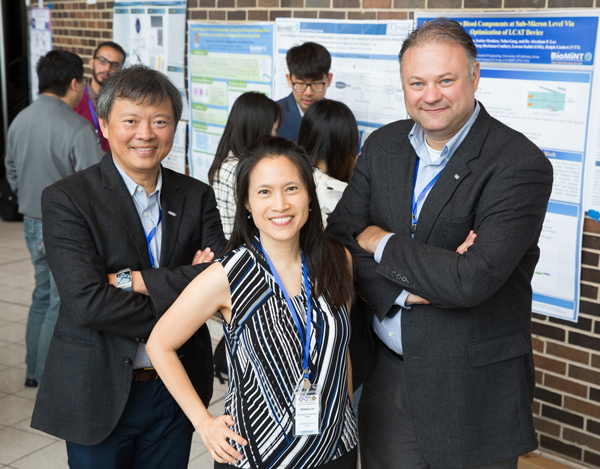NSF Grant Supports Center to Develop Microfluidics-based Solutions
 Nov. 19, 2018 - UC Irvine has received phase two funding of $750,000 from the National Science Foundation to support the Center for Advanced Design and Manufacturing of Integrated Microfluidics (CADMIM). The center, which launched five years ago, has two sites – one at UCI and another at the University of Illinois at Chicago. CADMIM is an NSF Industry-University Cooperative Research Center, which fosters long-term partnerships among academia, industry and government in various technology sectors. Total phase two funding for the two-site center is $1.25 million over five years.
Nov. 19, 2018 - UC Irvine has received phase two funding of $750,000 from the National Science Foundation to support the Center for Advanced Design and Manufacturing of Integrated Microfluidics (CADMIM). The center, which launched five years ago, has two sites – one at UCI and another at the University of Illinois at Chicago. CADMIM is an NSF Industry-University Cooperative Research Center, which fosters long-term partnerships among academia, industry and government in various technology sectors. Total phase two funding for the two-site center is $1.25 million over five years.
CADMIM focuses on developing miniature devices that can perform biochemical analytical functions quickly and cheaply. These chips have the potential to rapidly detect dangerous toxins in the blood, quickly screen hundreds of potential drugs, isolate cells for cancer diagnostics and treatment, or provide information on plant health that can improve crop outputs.
The UCI site has expertise in microfluidic sample preparation (cell and molecular sorting/separation, tissue dissociation, etc.), droplet-based microfluidics, autonomous microscale fluidic handling and various non-invasive detection methods.
“It is gratifying to know that the National Science Foundation is recognizing and rewarding the many accomplishments of CADMIM in its first five years, in research, technology transfer and most importantly, in building a community of students, faculty and industrial members that bridges advanced research with real-world applications,” said Abe Lee, CADMIM director and William J. Link Professor and chair of biomedical engineering at the UCI Samueli School of Engineering.
“In the last five years, CADMIM researchers have worked with industry leaders to provide customized solutions using advanced microfluidics technology,” said Ian Papautsky, the Richard and Loan Hill Professor of bioengineering in the UIC College of Engineering and leader of the UIC CADMIM site. “We look forward to bringing more industry partners on board, working with them to advance microfluidics technology and develop solutions for their needs, and also to providing unique internship opportunities to our grad students through these partnerships.”
CADMIM has worked with several industry leaders over the last five years, including Beckman Coulter, Corteva Agriscience, KWS, Monsanto, QIAGEN, ThermoFisher Scientific, Canon U.S. Life Sciences, Procter & Gamble, GSK, Genomics Institute of the Novartis Research Foundation, Douglas Scientific, Amgen Inc., Genentech Inc., Corning Inc., Los Alamos National Laboratories and Air Force Research Labs.
CADMIM industry partners provide funding for university researchers to develop solutions for specific needs or problems.
UCI and UIC CADMIM researchers working with GSK, for example, are developing a human liver culture platform using induced pluripotent stem cell technology. These tools can screen thousands of compounds in early drug discovery using a sustainable and genetically diverse source of patient-specific cells. “Cell micropatterning is also being employed to organize the liver cultures precisely at the cellular scale, allowing for optimization of liver function and rapid identification and assessment of each cultured cell type by automated microscopy,” added investigator Elliot Hui, an assistant professor of biomedical engineering at the Samueli School.
In another project with global agricultural firm Corteva Agriscience, UCI CADMIM researchers are exploring the use of microfluidics in the genotype selection process to help crops adapt and thrive in changing weather conditions. As a crop breeding company, Corteva processes millions of samples each year in its effort to develop more robust varieties faster, cheaper and with higher quality results. The collaboration has resulted in a working prototype for a potential microfluidic instrument.
“The microfluidic tools that CADMIM develops can also have global impact on our food supply, by detecting molecular analysis techniques to improve the health and quality of agricultural crops,” said Lee, lead researcher on the project. “The Corteva-sponsored projects are leveraging the technology developed for human health to study plant cells and sort for desirable genotypes and correlated phenotypes.”
Elliot Hui, Jered Haun, Michelle Khine and Michelle Digman from UCI, and Salman Khetani, David Eddington and Jie Xu from UIC, are other key researchers at CADMIM.
– Lori Brandt
